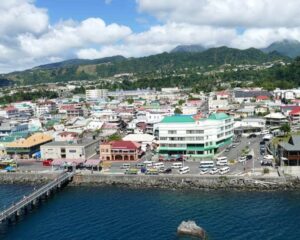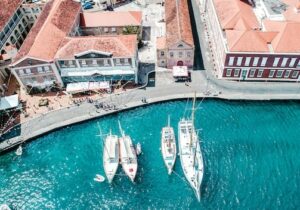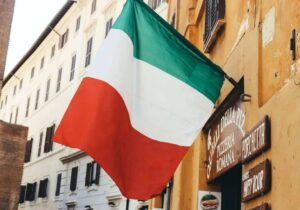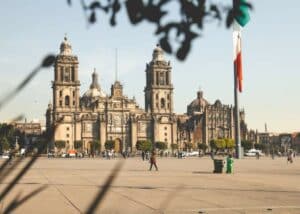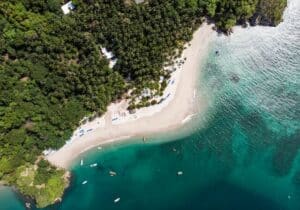
The rise of remote work has given people more freedom to travel and relocate, as they are no longer tied to one location. Some countries have created the Digital Nomad Visa, which is targeted at remote workers and has several benefits. There are also many residency and citizenship by investment options for those looking to move out of the US and invest in another economy for more benefits.
Therefore, in this guide, we will take you through everything you need to know about moving abroad as an American citizen. We will cover:
Reasons American Expats are Moving Abroad
There is a growing number of Americans moving abroad for various reasons. According to the Global Citizen Solutions Retirement Guide for U.S. Citizens, at least 5.4 million Americans lived abroad in 2023, though the State Department estimates the figure, including tourists, at around 9 million. Motivations include better opportunities, higher quality of life, and the benefits of second citizenship, such as easier travel and access to social services. Tools like the Global Passport Index help by ranking passports based on enhanced travel access and simplified visa processes, making it easier to choose the best country to immigrate to.
Cost of living
Americans moving abroad often prioritize a lower cost of living, focusing on areas like housing, healthcare, and daily expenses.
Better Healthcare
Many Americans move overseas for better healthcare because they find it more affordable and accessible.
Career opportunities
U.S citizens move abroad for job opportunities, especially in industries needing specialized skills or valuing international experience.
Retirement
Several Americans move out of the U.S to retire, seeking a slower pace of life, better weather, and lower living costs.
Tax benefits
Moving to a country with favorable tax policies helps individuals keep more of their income through lower income taxes, no taxes on foreign-earned income, and reduced corporate taxes, benefiting entrepreneurs and high earners.
Higher Quality of Life
Americans often relocate to countries with better work-life balance, safety, and overall well-being. Many places rank highly on happiness or peace indexes, offering a more fulfilling lifestyle.
Education
Access to affordable or high-quality education is another reason to relocate. Some countries provide low-cost or free education, benefiting families and individuals pursuing academic goals.
Escape from high crime rates
Safety is always a priority, and most Americans move abroad seeking safer environments with lower crime rates. Many countries offer higher personal safety and public order than some parts of the U.S.
Seven Steps on How to Move out of the USA
For someone figuring out how to leave the U.S., there are a few things to consider to make sure everything goes well, such as managing your finances, choosing a country, and handling legal matters. By breaking it down, you can make the process of relocating simpler and smoother.
Step one: Choose a destination
There are nations that are considered the easiest countries to immigrate to, and gaining residency or citizenship should align with your reasons and goals for moving out of the US. Some of these reasons may include:
- Career opportunities: Choose a country with a strong job market or business-friendly environment, depending on your goals.
- Taxes and cost of living: Look for countries with low taxes and affordable living costs to save money.
- Climate and lifestyle: Decide if you want a warm tropical climate or cooler weather, and consider the pace of life (city vs. rural).
- Political stability and safety: Pick a country with a stable government and low risks of political unrest.
Step two: Choose the Right Visa
Depending on your purpose, apply for the appropriate visa:
- Work Visa: For employment in another country.
- Student Visa: If you’re pursuing education abroad.
- Retirement Visa: This is for retirees moving to affordable destinations like Costa Rica or Panama.
- Golden Visa: If you plan to invest in real estate or start a business.
- For more permanent options, citizenship by investment is also a choice.
Step three: Residency or Citizenship
When moving abroad, you must decide between residency and citizenship, depending on how long you plan to stay and how deeply you want to integrate into your new country.
Getting a second residency lets you live abroad while keeping ties to the U.S. Temporary residency is for short stays. In contrast, permanent residency allows you to live indefinitely and enjoy local benefits. As a permanent resident, you remain a U.S. citizen and must manage taxes and banks in both countries.
If you want full rights, including voting and government benefits, you can apply for citizenship in your new country, but some countries may require you to give up your U.S. citizenship.
Step four: Understand the visa and legal requirements
For American expats looking to leave the U.S. permanently, residency or citizenship by investment is often the easiest route. This involves investing in a country’s economy in exchange for residency or citizenship.
While each country’s investment program may vary, most require the following:
- Be over 18
- Have a clean criminal record
- Be in good health
- Not be from a restricted country
- Make the required investment
Other possible requirements include:
- Paying government fees
- Holding the investment for five years or more
- Having a certain amount of savings or a good employment history
- Not having been denied entry to specific countries
Step five: Organize your assets
Efficient asset management is key to a smooth transition when moving abroad. Think about where your assets are and what you want to do with them.
Your assets may include real estate, precious metals, and IRAs. It’s important to assess their value before making decisions.
- Real Estate: Sell your U.S. properties and invest offshore if you want to cut ties. Keeping them may still mean paying U.S. property taxes.
- IRAs: You can cash out, stop contributing, or move your IRA to an offshore account for more control and fewer regulations.
- Precious Metals: Instead of transporting metals on flights, use a logistics company to move them to secure vaults or non-bank deposits in places like the Cayman Islands or Singapore.
Make sure your asset decisions align with your relocation goals.
Step six: Finalize your business
If you’re a business owner moving abroad, your business could be an asset or a liability. If it’s location-independent, you can transfer it offshore to reduce taxes and lower costs while cutting ties with the U.S.
However, if your business is tied to a specific location and you don’t plan to sell it, you’ll still need to pay U.S. taxes. Living abroad may offer some tax relief, but it won’t fully exempt you from U.S. taxes.
Step seven: Notify relevant U.S. Agencies
These are some of the important agencies to notify
- USPS: Forward your mail to a trusted address to avoid missing important letters.
- Social Security Administration: If you receive benefits, update your address with them to avoid disruptions.
- Renounce Citizenship (Optional): If you choose to renounce your U.S. citizenship, follow the official process through the State Department, which includes an appointment, a renunciation fee, and paperwork.
Best Citizenship by Investment Options for American Expats
Malta
Quality of Life Index ranking: 25
- Average cost of living: €1,200 to €1,500 per month
Malta is an ideal option for American expats, offering easy pathways to residency and citizenship through real estate investments. As the only EU country where English is an official language, it provides a smooth transition for Americans.
The Malta citizenship by investment program starts with a real estate investment of at least €700,000, plus a non-refundable donation of €600,000. The process of securing a passport for Americans will take about 36 months.
Benefits of living in Malta
-
- High standard of living, with excellent healthcare and education systems.
- English is widely spoken, making it easy for expats to integrate.
- Access to the entire EU and Schengen Zone with visa-free travel.
- Mediterranean climate with great historical sites, dining, and culture.
- Malta is one of the safest countries in Europe, and it has a low crime rate.
Antigua and Barbuda
Quality of Life Index ranking: 69
- Average cost of living: $2,000 – $3,000 per month
For Americans seeking a Caribbean haven, Antigua and Barbuda’s citizenship by investment offers two straightforward options: a $230,000 donation to the National Development Fund (NDF) or a $300,000 real estate investment (held for 5 years).
This tax-friendly nation has no personal income tax and offers a high quality of life with gorgeous beaches, a warm climate, and a safe, stable environment. It’s perfect for retirees, digital nomads, or those seeking a relaxed lifestyle.
Benefits of living in Antigua and Barbuda
- Gorgeous beaches, warm climate, and a relaxed Caribbean lifestyle.
- Safe environment with a focus on community and tourism.
- Tax-friendly, with no personal income tax and favorable tax policies for expats.
- Great for retirees, digital nomads, and those looking for peaceful living.
Vanuatu
Quality of Life Index ranking: 113
- Average cost of living: $1,470 to $3,050 per month
For Americans concerned about rising taxes, Vanuatu’s citizenship by investment offers a tax-free haven with no income, inheritance, or capital gains taxes. It is located in the South Pacific and imposes no corporate taxes, making it ideal for relocating U.S.-based businesses.
Americans can gain citizenship with a $130,000 contribution to the National Development Fund. The process is fast, granting a passport within 60 days. Only an annual registration fee and a small pension fund contribution are required.
Benefits of living in Vanuatu
- Vanuatu has no personal income, inheritance, or capital gains taxes.
- It offers a relaxed lifestyle and affordable local goods and services.
- Residency options are available for retirees.
- The country is safe, with low crime rates.
Dominica
- Quality of Life Index ranking: 58
- Average cost of living: $1,200 – $2,000 per month
Dominica is known as the “Nature Island” and offers a relaxed, eco-friendly lifestyle through the Dominica citizenship by investment program. Americans can gain citizenship with a $200,000 donation to the Economic Diversification Fund (EDF) or a $200,000 real estate investment (held for 3 years).
With no wealth, inheritance, or capital gains tax, Dominica is perfect for those seeking peace, nature, and safety. The country has very low crime rates and offers a close-knit, English-speaking community.
Benefits of living in Dominica
- Safe, with a strong sense of community and low crime rates.
- English-speaking with a peaceful, environmentally focused lifestyle.
- Tax advantages, including no wealth, inheritance, or capital gains tax.
- One of the safest countries in the Caribbean with very low crime rate
Grenada
- Quality of Life Index ranking: 70
- Average cost of living: $1,800 – $2,500 per month
Grenada’s citizenship by investment program is excellent for Americans seeking safety, tax benefits, and visa-free travel.You can donate $235,000 to the National Transformation Fund (NTF) or invest $270,000 in shares or $350,000 as a sole real estate owner.
Grenada does not tax foreign income, inheritance, or capital gains and allows visa-free travel to over 140 countries, including the U.K. and the Schengen Area. The country is known for its beautiful beaches, friendly locals, and low crime rates.
Benefits of living in Grenada:
- Known for its safety, friendly locals, and quiet lifestyle.
- Access to visa-free travel to over 140 countries, including the U.K. and Schengen Area.
- Beautiful beaches, spice plantations, and nature reserves.
- Tax benefits include no foreign income, inheritance, or capital gains tax.
- Grenada is considered very safe, with low crime rates and a welcoming community
St. Kitts and Nevis
- Quality of Life Index ranking: –
- Average cost of living: $1,500 – $2,500 per month
St. Kitts and Nevis’ citizenship by investment program is attractive for Americans seeking a peaceful, tax-friendly destination. You can invest $250,000 in the Sustainable Growth Fund (SGF) or $400,000 in real estate (held for 7 years) to gain citizenship.
With no personal income, capital gains, or inheritance tax, it’s ideal for retirees or those looking for a quiet, tropical lifestyle. The country is English-speaking and is known as one of the safest Caribbean islands, with beautiful beaches, water sports, and a laid-back environment.
Benefits of living in St. Kitts and Nevis
- Known for being one of the safest countries in the Caribbean.
- Tropical climate, beautiful beaches, and English-speaking.
- It is excellent for retirees and those seeking a quiet, low-key lifestyle.
- No personal income tax, capital gains tax, or inheritance tax.
The Best Visas for Americans
If you are looking into how to leave the U.S. but want to start with small steps, then the best step is to find the best visa that will allow you to get short-term residency. Several countries provide the option of residency if you can prove that you earn a specified foreign-earned income.
Spain Non-lucrative Visa
- Quality of Life Index ranking: 9
- Average cost of living: €1,500 – €3,000 per month
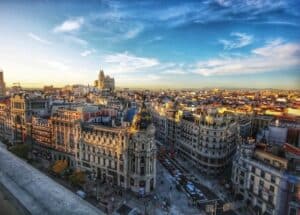
The initial Non-lucrative Visa is valid for one year. It is renewable twice for two additional years, totaling five years of residency. You must spend at least 183 days of the year in Spain and continue to prove that you have sufficient economic means to support yourself in renewing the visa.
After the fifth year of residency, you can apply for permanent residence in Spain. The country also has a residency by investment option through its attractive Spain Golden Visa Program, which will end on 3 April 2025.
Benefits of Spain Non-lucrative Visa
- Live in Spain without a job offer.
- Access public healthcare with private health insurance.
- Enjoy Spain’s climate, culture, and lifestyle.
- Bring dependents (spouse and children) with you.
- Apply for permanent residency after five years.
- Travel to other Schengen countries for up to 90 days.
Portugal D7 Visa
Portugal’s D7 Visa has become one of the most popular options for American expats to gain EU residency, and the capital city of Lisbon is already home to many American expats. The income requirements are much lower than the Spain Non-lucrative Visa; however, maintaining a minimum deposit in a Portuguese bank account is necessary to sustain a valid visa.
Foreigners must earn a minimum monthly income of €870.00 and maintain a bank balance of €19,840. The initial D7 Visa is valid for two years and renewable for three years. After five years, D7 Visa holders can apply for permanent residency or even Portuguese citizenship. Portugal also offers a residency by investment option through its Portugal Golden Visa.
Benefits of the D7 visa:
- Allows retirees and remote workers to live in Portugal while keeping income abroad.
- Access to Portugal’s public healthcare system.
- Apply for permanent residency or citizenship after five years.
- Relatively affordable living costs and a pleasant climate.
- Dependents can join under the same visa.
- Travel freely within the Schengen Area for up to 90 days.
Italy Digital Nomad Visa
- Quality of Life Index: 23
- Average cost of living: €1,500 – €3,000 per month
The Italy Digital Nomad Visa is designed for remote workers and digital nomads looking to enjoy Italy’s culturally rich country. This visa allows individuals to live in Italy while working remotely for a company outside the country or running their own business.
Applicants must demonstrate a minimum monthly income of €2,066; they must also have a passport valid for at least six months, proof of remote employment or ownership of a business outside Italy, and health insurance covering all medical expenses in Italy.
Benefits of the Italy Digital Nomad Visa
- Allows digital nomads to live and work remotely in Italy.
- Access to Italy’s public healthcare system.
- Potential pathway to long-term residency or citizenship.
- Travel freely within the Schengen Area for up to 90 days.
- Dependents can apply for residency under the same visa.
- No Italian language proficiency is required for the application.
Retirement is one of the main reasons Americans can choose to move out of the US. These are some of the best countries to retire in, and they offer great visa options for retirees.
Mexico (Temporary Resident Visa and Permanent Resident Visa)
- Quality Life Index ranking: 73
- Average cost of living: $1,300 – $1,500
Mexico is a great option for U.S. retirees, offering Temporary and Permanent Resident Visas. The Temporary Visa is for stays over six months but under four years and requires a monthly income of $3,100 for the past six months or savings of €47,500.
The Permanent Visa is for indefinite stays, with retirees qualifying through a monthly income of €1,491 for six months or €98,440 in savings. Non-retirees must follow a four-year process for permanent residency.
Benefits of the Mexico Temporary Resident Visa and Permanent Resident Visa)
- Freedom to leave and return without restrictions.
- Offers a route to transition into permanent residency.
- Access Mexico’s lower cost of living..
- Lower financial requirements for retirees compared to other applicants.
- Option to bring dependents under the same visa.
- Enjoy full residency benefits without needing to leave Mexico frequently.
Costa Rica (Pensioner Visa)
- Quality Life Index ranking: 38
- Average cost of living: $1,500 and $2,500.
Costa Rica is another country offering beautiful weather and a relaxed lifestyle. It is perfect for Americans looking to retire because it has the Pensionado Program, which is tailored to retirees with a stable pension income.
This program requires proof of pension funds but does not demand a significant financial investment. It requires a monthly income of about €920, and the applicant must maintain residency for just one day per year.
Benefits of the Costa Rica Pensioner Visa)
- No significant financial investment needed.
- Maintain residency by staying just one day per year.
- Access to Costa Rica’s public healthcare system (Caja).
- Enjoy a low cost of living and a beautiful tropical climate.
- Opportunity to bring dependents (spouse and children).
- Option to apply for permanent residency after three years.
Belize (Qualified Retirement Program)
- Quality Life Index ranking: 61
- Average cost of living: $1,200 to $2,000
Belize is also perfect for American retirees as it offers the Qualified Retirement Program, which provides a route to residency for retirees from all Commonwealth countries, the United States, and members of the EU.
Belize’s official language is English, making it even easier for U.S. citizens to integrate into the community. The program has no residency requirement, but applicants must have a $2,000 monthly income or $24,000 annually in an approved foreign currency.
Benefits of the Belize Qualified Retirement Program)
- Exemption from Belizean income tax on global income.
- Duty-free importation of personal goods, including vehicles, boats, and aircraft.
- No minimum stay requirement to maintain residency.
- Access to Belize’s stunning tropical environment and English-speaking community.
- Opportunity to include dependents (spouse and children) under the program.
Global Citizen Solutions is a boutique migration consultancy firm with years of experience delivering bespoke residence and citizenship by investment solutions for international families. With offices worldwide and an experienced, hands-on team, we have helped hundreds of clients worldwide acquire citizenship, residence visas, or homes while diversifying their portfolios with robust investments. We guide you from start to finish, taking you beyond your citizenship or residency by investment application. How Can Global Citizen Solutions Help You?

Frequently Asked Questions about Moving Out of the US
Can I move permanently out of the US?
How can I move out of America without a job?
There are several options to move out of America without a job. These options include investment migration, which allows you to invest a specified amount of money in a country’s economy, and in return, you be offered residency in that country. Another option is to pursue a student visa, which requires enrolling in higher education within the host country.
How much money do I need to move out of the US?
Where is the best place for an American to live in Europe?
The best countries to move to from the USA in Europe depend on individual preferences, priorities, and circumstances. Some popular destinations for American expats include countries like Portugal, Spain, and Malta, which are all known for their great quality of life.
Is it hard for an American to move to Europe?
Moving to Europe as an American can be challenging due to varying visa requirements, residency laws, and bureaucratic processes in different countries. Language barriers and cultural adjustments may also pose difficulties. However, many Americans successfully relocate with proper research, planning, and support, making it a feasible option.
What are the steps to move out of the US permanently?
What documents do I need to move out of the US?
To move out of the U.S., you typically need the following documents:
- Valid passport.
- Visa or residency permit for your destination.
- Birth certificate and marriage certificate (if applicable).
- Financial records (bank statements, tax returns).
- Health records and immunization history.
- Driver’s license or ID.
- Shipping or customs documents (for belongings).

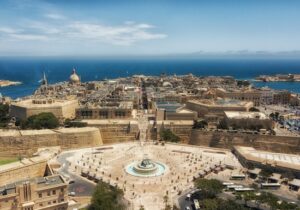 Quality of Life Index ranking: 25
Quality of Life Index ranking: 25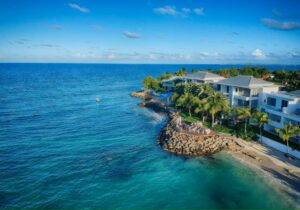 Quality of Life Index ranking: 69
Quality of Life Index ranking: 69 Quality of Life Index ranking: 113
Quality of Life Index ranking: 113